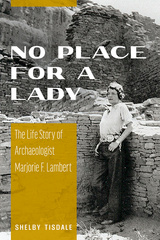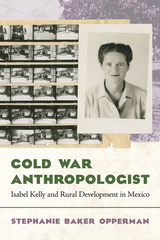An Anthropologist's Arrival
A Memoir
The University of Arizona Press
Ruth M. Underhill (1883–1984) was one of the twentieth century’s legendary anthropologists, forged in the same crucible as Franz Boas, Ruth Benedict, and Margaret Mead. After decades of trying to escape her Victorian roots, Underhill took on a new adventure at the age of forty-six, when she entered Columbia University as a doctoral student of anthropology. Celebrated now as one of America’s pioneering anthropologists, Underhill reveals her life’s journey in frank, tender, unvarnished revelations that form the basis of An Anthropologist’s Arrival. This memoir, edited by Chip Colwell-Chanthaphonh and Stephen E. Nash, is based on unpublished archives, including an unfinished autobiography and interviews conducted prior to her death, held by the Denver Museum of Nature & Science.
In brutally honest words, Underhill describes her uneven passage through life, beginning with a searing portrait of the Victorian restraints on women and her struggle to break free from her Quaker family’s privileged but tightly laced control. Tenderly and with humor she describes her transformation from a struggling “sweet girl” to wife and then divorcée. Professionally she became a welfare worker, a novelist, a frustrated bureaucrat at the Bureau of Indian Affairs, a professor at the University of Denver, and finally an anthropologist of distinction.
Her witty memoir reveals the creativity and tenacity that pushed the bounds of ethnography, particularly through her focus on the lives of women, for whom she served as a role model, entering a working retirement that lasted until she was nearly 101 years old.
No quotation serves to express Ruth Underhill’s adventurous view better than a line from her own poetry: “Life is not paid for. Life is lived. Now come.”
In brutally honest words, Underhill describes her uneven passage through life, beginning with a searing portrait of the Victorian restraints on women and her struggle to break free from her Quaker family’s privileged but tightly laced control. Tenderly and with humor she describes her transformation from a struggling “sweet girl” to wife and then divorcée. Professionally she became a welfare worker, a novelist, a frustrated bureaucrat at the Bureau of Indian Affairs, a professor at the University of Denver, and finally an anthropologist of distinction.
Her witty memoir reveals the creativity and tenacity that pushed the bounds of ethnography, particularly through her focus on the lives of women, for whom she served as a role model, entering a working retirement that lasted until she was nearly 101 years old.
No quotation serves to express Ruth Underhill’s adventurous view better than a line from her own poetry: “Life is not paid for. Life is lived. Now come.”
Ruth Underhill was a remarkable woman, an important advocate and educator for native culture who freed herself from the Victorian Quaker social corset. Her life is a compelling story, and the editors have ensured that it’s also a good read.’—Story Circle Book Reviews
‘This excellent book deserves a wider audience than just those interested in folklore, anthropology, Indians, and the Southwest. The editors have done a superb job of bringing Underhill’s unique voice back to us all.’—Museum Anthropology Review
‘A close reading of her experiences and observations gives true insights into the challenges that confronted exceptional women in the early twentieth century United States.’—Southwestern Lore
‘Ruth Underhill had a notable story to tell and An Anthropologist’s Arrival: A Memoir is that story.’—Canadian Journal of Archaeology
‘Underhill’s story is intriguing precisely because she did her work, observed the anthropologists around her with a keen ethnographic eye, and explained her feelings as she came to have a career in anthropology on the cusp of professionalization. No one else talks about the Depression, the early funding, the fieldwork experience in quite this way. I found it fascinating.’—Regna Darnell, author of And Along Came Boas: Continuity and Revolution in Americanist Anthropology
Ruth Underhill was a remarkable woman, an important advocate and educator for native culture who freed herself from the Victorian Quaker social corset. Her life is a compelling story, and the editors have ensured that it’s also a good read.’—Story Circle Book Reviews
‘This excellent book deserves a wider audience than just those interested in folklore, anthropology, Indians, and the Southwest. The editors have done a superb job of bringing Underhill’s unique voice back to us all.’—Museum Anthropology Review
‘A close reading of her experiences and observations gives true insights into the challenges that confronted exceptional women in the early twentieth century United States.’—Southwestern Lore
‘Ruth Underhill had a notable story to tell and An Anthropologist’s Arrival: A Memoir is that story.’—Canadian Journal of Archaeology
‘Underhill’s story is intriguing precisely because she did her work, observed the anthropologists around her with a keen ethnographic eye, and explained her feelings as she came to have a career in anthropology on the cusp of professionalization. No one else talks about the Depression, the early funding, the fieldwork experience in quite this way. I found it fascinating.’—Regna Darnell, author of And Along Came Boas: Continuity and Revolution in Americanist Anthropology
Ruth M. Underhill (1883–1984) received her PhD in anthropology from Columbia University and held positions with the Bureau of Indian Affairs and the University of Denver, where she was named professor emeritus upon her retirement in 1952. Specializing in southwestern anthropology, Underhill lived on Indian reservations and wrote comprehensively about the Tohono O’odham, Navajo, and Mohave communities. She is the author of several books.
Chip Colwell-Chanthaphonh is curator of anthropology at the Denver Museum of Nature & Science. He has authored and edited nine books, including Inheriting the Past: The Making of Arthur C. Parker and Indigenous Archaeology. He is a recipient of the 2009 National Council on Public History Book Award.
Stephen E. Nash is curator of archaeology and chair of the Department of Anthropology at the Denver Museum of Nature & Science. Previously he served as head of collections in anthropology at the Field Museum in Chicago. He has authored and edited five books on subjects ranging from the history of archaeological tree-ring dating to museum collections.
Chip Colwell-Chanthaphonh is curator of anthropology at the Denver Museum of Nature & Science. He has authored and edited nine books, including Inheriting the Past: The Making of Arthur C. Parker and Indigenous Archaeology. He is a recipient of the 2009 National Council on Public History Book Award.
Stephen E. Nash is curator of archaeology and chair of the Department of Anthropology at the Denver Museum of Nature & Science. Previously he served as head of collections in anthropology at the Field Museum in Chicago. He has authored and edited five books on subjects ranging from the history of archaeological tree-ring dating to museum collections.
Genealogy
Monographs
Introduction
Part One: Becoming Ruth Underhill
A Zigzag Life
Do Good to Others
Mother Was an Angel, Part 1
They Were Murrays
Abram S. Underhill
Mother Was an Angel, Part 2
Youth Passing
Quakers and Darwin
Picnics and Dances
Vassar and Europe
The Society
The Big Love
World War I
A Marriage Begins and Ends
Part Two: Becoming An Anthropologist
Columbia, Part 1
Papa Franz
Coming of Age in Arizona
Henrietta
Chona and the O’odham
Columbia, Part 2
The Fruit of the Saguaro
Indian Affairs
Around the World
We’re Going to Live This Year
Acknowledgments
Figure Credits
Index

















